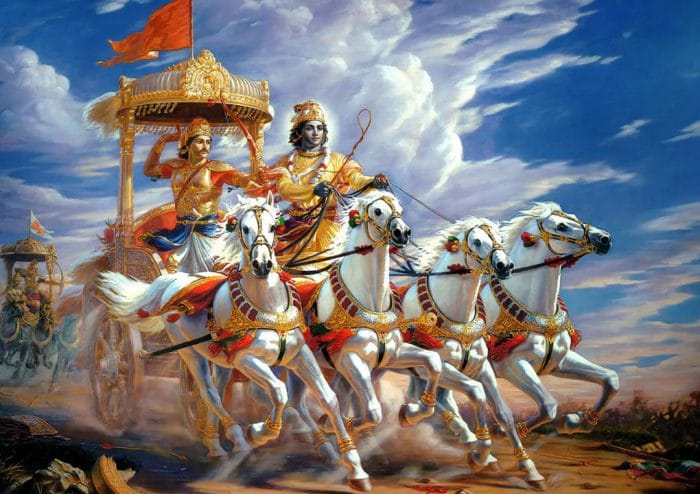Upanishads are the parts at the end of the Vedas which includes the question and answers generated while Vedas had been told so the Vedas can be understood better. It had been written by the sages at the time and it is written as dialogues between the teacher and the student. The word Upanishad literally means “sitting down near” referring to the student sitting down near the teacher while getting this ancient knowledge.
Even though the subjects are different, Upanishads always talk about the same thing; what is the Infinite, what is the essence, how can you reach that essence, how does the Self come to life as a consequence of simplification and renunciation…
The Isha Upanishad which we will discuss in this article takes its name from Ishvara, and it means eternal, creator. It talks about the Self, about the concept of “I”, and the source of the creation. Even though it is a short Upanishad, it contains detailed knowledge about eternal, true knowledge, how to obtain the truth.
Let’s look at these subjects through Isha Upanishad;
“Whatever there is changeful in this ephemeral world, all that must be enveloped by the Lord. By this renunciation, support yourself. Do not covet the wealth of anyone.”
“In the world, one should desire to live a hundred years; what he desires will be given to him but only in this way: whatever he does shouldn’t be clinging to him.”
It says that everything that exists is the same, they are all one. Don’t cling to what you do, what you own; these won’t take you to the eternal, to bliss. Because only what is real is eternal. And something that is finite can give you only temporary happiness. You can only become happy when you understand the whole in everything and you are part of this whole. Therefore, don’t be possessive. Whatever you do, don’t let them cling to you. Do them just because you can. You’ve certainly experienced this, once someone stops desiring something, it comes true. When one no longer clings to it, whatever s/he desires is with him/her.
“What delusion, what sorrow can there be for that wise man who realizes the unity of all existence by perceiving all beings as his own Self?”
And once the person realizes that there is the same essence in everything, that everything is the same, that person can never face anything other than the Self. There are no more differences for that person. S/he sees everything and everyone as one. As he knows, nobody is different from each other, the only difference is everyone’s own manner.
It describes the Eternity;
“It moves and moves not; It is far and likewise near. It is inside all this and It is outside all this.”
By saying this, it explains that all the possibilities are inside this infinite source. Because only then it can be infinite. It says, all the possibilities, everything you know is it because it is infinite. It is difficult for one to realize the Infinite because everything he experiences is finite. Everything comes to an end, even when something doesn’t end, eventually, his life will come to an end. Because of what mentioned is intangible, doesn’t have an expressible form, and because all the experiences of human take place through sense organs, one cannot understand the Infinite. Therefore Upanishad says; the Infinite is nothing that can be reached by your experiences through your sense organs. In other words, you cannot reach the Infinite by smelling, by seeing; you cannot reach it by something external. Infinite is something to become not something to comprehend. With your senses, you can only comprehend what you are not, and when you really understand what you are not then what is only left is the infinite one.
And so it tells how to reach this truth, this true knowledge. And it mentions the danger that can be faced on this path.
“Into greater darkness they enter who thinks that they have reached the true knowledge.”
Why do they enter greater darkness? Because as I mentioned above, the true knowledge is not something to be reached. You can be the truth itself but you cannot reach the truth. Because what did we say, the sense organs can never reach the Self. Therefore, if you think you have reached the truth, in fact, you’ve entered the darkness.
“One thing, they say, is obtained from the true knowledge; another, they say, from the one that is not knowledge. Thus we have heard from the wise who taught us this.
He who knows that both the knowledge and that is not knowledge, overcomes death by means of the not knowledge and obtains immortality by the means of the knowledge.”
Only the ones who use the true knowledge obtained by the Samadhi state as a tool, then also leave that knowledge afterward, can reach the Self. By the means of this knowledge, they can see what is missing and become whole.
And Isha Upanishad warns again:
“Into a blind darkness they enter who worship the unreal reason, but into a greater darkness they enter who think they reached the true reason.”
In other words, what you are looking for is not related to your true self then it means your mind is stuck to your actions in this world. As it said at the beginning you are clinging to your actions. If you are worshipping for material gain or to gain heaven, then these are gross practices; meaning they are still for this world and won’t take you to the Infinite. Whatever you are doing, if you are doing it for yourself, for reaching your true self, only then you can reach the Truth.
“Now give your breath to the sky, to the Immortal on! May this body be burnt to ashes! Om. O mind, remember, remember all that you have done.”



No Comments